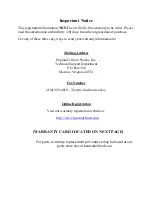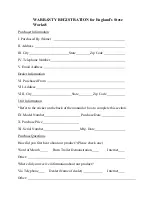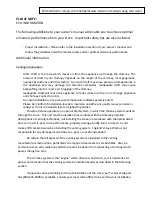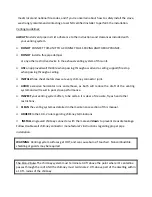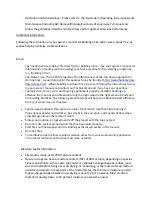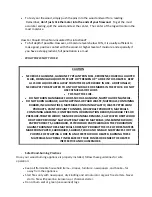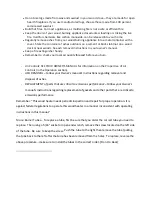
Page | 21
Daily
Maintenance
MAINTENANCE
•
Inspect
the
firebox
for
ash
accumulation;
remove
excess
ash
and
follow
instructions
below
regarding
disposal.
Ash
should
not
be
allowed
to
excessively
accumulate
in
the
stove.
Monthly
Maintenance
• C
heck
the
door
handle
for
proper
operation
and
to
be
certain
an
airtight
seal
is
still
being
made
by
the
door.
•
Inspect
the
chimney
system
and
chimney
connector
and
sweep
if
necessary.
Although
cleaning
may
be
required
less
than
monthly,
ALWAYS
inspect
the
venting
system
monthly
to
decrease
the
chance
of
a
chimney
fire.
•
Visually
inspect
the
ceramic
fiber
insulating
boards
in
the
firebox
for
cracks
and/or
breakage.
Slight
surface
cracks
will
not
affect
the
performance
of
the
boards,
but
cracked
or
crumbling
boards
should
be
replaced
immediately.
•
Visually
inspect
the
secondary
combustion
tubes
for
cracks,
warping
and
corrosion.
Although
these
tubes
are
constructed
from
stainless
steel,
they
operate
at
very
high
temperatures
and
can
eventually
wear
out
from
normal
use.
Yearly
Maintenance
•
Check
all
gaskets
(window
and
door)
for
wear
and
to
be
certain
they
still
maintain
an
airtight
seal.
See
the
following
page
for
instructions.
•
Thoroughly
clean
the
chimney
system
and
the
chimney
connector
system.
Since
the
chimney
connector
is
generally
exposed
to
high
exhaust
temperatures,
inspect
it
carefully
for
leaks
and
weak
spots;
replace
any
questionable
pieces.
[In
the
case
of
straight
through
the
roof
chimney
system,
be
certain
to
remove
the
ceramic
fiber
baffles
before
pushing
the
chimney
sweeping
brush
down
into
the
firebox.
Forcefully
hitting
the
top
of
the
baffle
with
a
cleaning
brush
or
rod
can
damage
or
destroy
the
baffle.]
•
Remove
all
ash
from
the
stove,
including
the
ash
which
accumulates
on
the
top
of
the
firebox
baffles.
Leave
the
air
control
open
during
the
non
‐
heating
months
to
allow
some
air
to
flow
through
the
stove
to
help
prevent
corrosion.
A
small
open
container
of
cat
litter
in
the
stove
can
help
prevent
corrosion
during
the
humid
summer
months;
be
certain
to
remove
it
before
building
a
fire
in
the
fall.
IMPROPER
GASKET
MAINTENANCE,
INCLUDING
FAILURE
TO
REPLACE
GASKETS,
CAN
CAUSE
AIR
LEAKS
RESULTING
IN
AN
UNCONTROLLABLE
FIRE
IN
THE
UNIT.
Disposal
of
Ashes
–
Ashes
should
be
placed
in
a
metal
container
with
a
tight
fitting
lid.
The
closed
container
of
ashes
should
be
placed
on
a
noncombustible
floor
or
on
the
ground,
well
away
from
all
combustible
materials,
pending
final
disposal.
If
the
ashes
are
disposed
of
by
burial
in
soil
or
otherwise
locally
dispersed,
they
should
be
retained
in
the
closed
container
until
all
cinders
have
been
thoroughly
cooled.
























